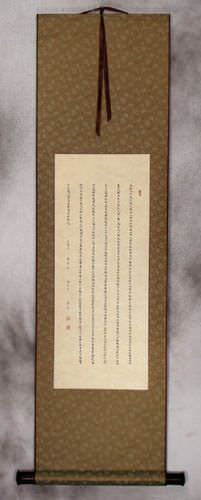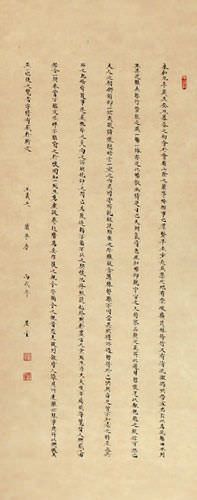
44¾"
16¼"

Approximate Measurements
Artwork Panel: 23cm x 57.3cm ≈ 9" x 22½"
Silk/Brocade: 32.1cm x 114cm ≈ 12½" x 44¾"
Width at Wooden Knobs: 41.1cm ≈ 16¼"

Close up view of the artwork mounted to this silk brocade wall scroll




While this is a newly created wall scroll, the text of this calligraphy was written about 1664 years ago. This calligraphy depicts a sort of poetic article or prose that describes a poetry event at the Orchid Pavilion. Included are various emotions, thoughts, and other feelings of the author, Wang Xizhi.
This article has many title variations. Sometimes known as Lantingxu (蘭亭序), Landtingjixun (蘭亭集序), or Lantingji-xu amoung a few others.
| Characters | Pinyin | Translation |
|---|---|---|
| 蘭 亭 集 序 | lán tíng jí xù | Preface to the Poems Composed at the Orchid Pavilion |
| (王羲之) | Wáng Xīzhī | (by Wang Xizhi) |
| 永和九年, | Yǒnghé jiǔ nián | It is the ninth year of Emperor Mu of Jin's Yonghe era (20 Feb 353 - 8 Feb 354), |
| 歲在癸丑, | suì zài guǐ chǒu | The year of the Yin Water Ox, |
| 暮春之初, | mùchūn zhī chū | At the beginning of the third lunar month (after April 20, 353), |
| 會于會稽山陰之蘭亭, | huì yú Guìjī Shānyīn zhī lán tíng | We are all gathered at the orchid pavilion in Shanyin County, Guiji Commandery, |
| 脩禊事也。 | xiūxì shì yě | For the Spring Purification Festival. |
| 群賢畢至, | qún xián bì zhì | All of the prominent people have arrived, |
| 少長咸集。 | shào zhǎng xián jí | From old to young. |
| 此地有崇山峻領, | cǐdì yǒu chóngshānjùnlǐng | This is an area of high mountains and lofty peaks, |
| 茂林修竹, | màolínxiūzhú | With an exuberant growth of trees and bamboos, |
| 又有清流激湍, | yòu yǒu qīngliú jī tuān | It also has clear rushing water, |
| 映帶左右。 | yìng dài zuǒyòu | Reflecting the sunlight as it flows past either side of the pavilion. |
| 引以為流觴曲水,列坐其次; | yǐn yǐ wéi liú shāng qū shuǐ, lièzuò qícì | The guests are seated side by side to play the drinking game where a wine cup is floated down the stream and the first person sitting in front of the cup when it stops must drink. |
| 雖無絲竹管弦之盛, | suī wú sīzhú guǎnxián zhī shèng | Although we lack the boisterousness of a live orchestra, |
| 一觴一詠,亦足以暢敘幽情。 | yī shāng yī yǒng, yì zúyǐ chàngxù yōuqíng | With a cup of wine here and a reciting of poetry there, it is sufficient to allow for a pleasant exchange of cordial conversations. |
| 是日也,天朗氣清, | shì rì yě, tiān lǎng qì qīng | Today, the sky is bright and the air is clear, |
| 惠風和暢,仰觀宇宙之大, | huìfēnghéchàng, yǎng guān yǔzhòu zhī dà | With a gentle breeze that is blowing freely. When looking up, one can see the vastness of the heavens, |
| 俯察品類之盛,所以遊目騁懷, | fǔ chá pǐn lèi zhī shèng, suǒyǐ yóu mù chěnghuái | And when looking down, one can observe the abundance of things. The contentment of allowing one’s eyes to wander, |
| 足以極視聽之娛,信可樂也。 | zúyǐ jí shìtīng zhī yú, xìn kě lè yě | Is enough to reach the heights of delight for the sight and sound. What a joy. |
| 夫人之相與俯仰一世, | fú rén zhī xiāngyǔ fǔyǎng yī shì | Now all people live in this world together, |
| 或取諸懷抱,晤言一室之內; | huò qǔ zhū huáibào, wù yán yī shì zhī nèi | Some will take all of their aspirations, and share them in private with a friend; |
| 或因寄所托,放浪形骸之外。 | huò yīn jì suǒ tuō, fànglàngxínghái zhī wài | Still others will abandon themselves to reckless pursuits. |
| 雖趣舍萬殊,靜躁不同, | suī qǔshě wàn shū, jìng zào bùtóng | Even though everyone makes different choices in life, some thoughtful and some rash, |
| 當其欣于所遇,暫得于己, | dāng qí xīn yú suǒ yù, zàn dé yú jǐ | When a person meets with joy, he will temporarily be pleased, |
| 快然自足,不知老之將至。 | kuài rán zìzú, bùzhī lǎo zhī jiāng zhì | And will feel content, but he is not mindful that old age will soon overtake him. |
| 及其所之既倦,情隨事遷, | jí qí suǒ zhī jì juàn, qíng suí shì qiān | Wait until that person becomes weary, or has a change of heart about something, |
| 感慨係之矣。 | gǎnkǎi xì zhī yǐ | And will thus be filled with regrets. |
| 向之所欣,俛仰之間, | xiàng zhī suǒ xīn, fǔyǎng zhī jiān | The happiness of the past, in the blink of an eye, |
| 已為陳迹,猶不能不以之興懷; | yǐ wéi chén jī, yóu bùnéngbù yǐ zhī xìng huái | Will have already become a distant memory, and this cannot but cause one to sigh; |
| 况修短隨化,終期于盡。 | kuàng xiū duǎn suí huà, zhōng qī yú jìn | In any case, the length of a man’s life is determined by the Creator, and we will all turn to dust in the end. |
| 古人云﹕「死生亦大矣。」 | gǔrén yún: sǐ shēng yì dà yǐ | The ancients have said, "Birth and Death are both momentous occasions". |
| 豈不痛哉! | qǐbù tòng zāi | Isn’t that sad! |
| 每攬昔人興感之由, | měi lǎn xí rén xìng gǎn zhī yóu | Every time I consider the reasons for why the people of old had regrets, |
| 若合一契,未嘗不臨文嗟悼, | ruò hé yī qì, wèicháng bù lín wén jiē dào | I am always moved to sadness by their writings, |
| 不能喻之于懷。 | bùnéng yù zhī yú huái | And I can not explain why I am saddened. |
| 固知一死生為虛誕, | gù zhī yī sǐ shēng wéi xūdàn | I most certainly know that it is false and absurd to treat life and death as one and the same, |
| 齊彭殤為妄作。 | qí péng shāng wéi wàngzuò | And it is equally absurd to think of dying at an old age as being the same as dying at a young age. |
| 後之視今,亦由今之視昔。 | hòu zhī shì jīn, yì yóu jīn zhī shì xī | When future generations look back to my time, it will probably be similar to how I now think of the past. |
| 悲夫!故列敘時人, | bēi fú! gù liè xù shí rén | What a shame! Therefore, when I list out the people that were here, |
| 錄其所述,雖世殊事異, | lù qí suǒ shù, suī shì shū shì yì | And record their musings, even though times and circumstances will change, |
| 所以興懷,其致一也。 | suǒ yǐ xìng huái, qí zhì yī yě | As for the things that we regret, they are the same. |
| 後之攬者,亦將有感於斯文。 | hòu zhī lǎn zhě, yì jiāng yǒu gǎn yú sī wén | For the people who read this in future generations, perhaps you will likewise be moved by these words. |
More information and background about this article/poem can be found here: Wikipedia: Lantingji
This piece is painted with special Chinese ink on xuan paper (rice paper) mounted to a traditional silk-brocade wall scroll.
This calligraphy was done by Master Calligrapher 

 Sun Jian-Ping of Jinan in the Shandong Province of Northern China. This is a special piece because of the "xiao kai" or "small character" calligraphy. A lot of information in here in a small space.
Sun Jian-Ping of Jinan in the Shandong Province of Northern China. This is a special piece because of the "xiao kai" or "small character" calligraphy. A lot of information in here in a small space.